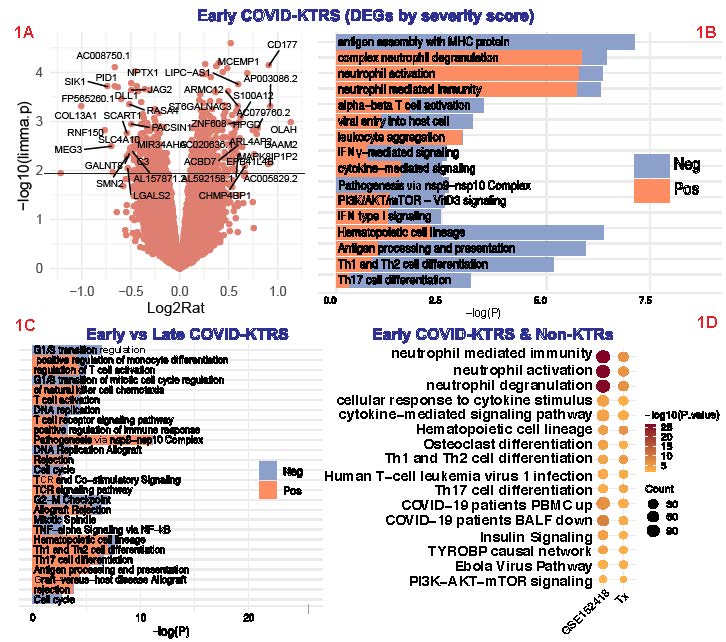Blood Transcriptomes of Kidney Recipients with Covid-19 Demonstrate Deficient Adaptive Immune Activation
1Nephrology, Yale University, New Haven, CT, 2Icahn School of Medicine at Mount Sinai, New York, NY, 3Montefiore Medical Center, New York, NY, 4Nephrology, Icahn School of Medicine at Mount Sinai, New York, NY, 5Icahn School of Medicine at Mount Sinai, New Haven, CT
Meeting: 2022 American Transplant Congress
Abstract number: 1297
Keywords: COVID-19, Kidney transplantation
Topic: Basic Science » Basic Science » 16 - Biomarkers: -omics and Systems Biology
Session Information
Session Name: Biomarkers: -omics and Systems Biology
Session Type: Poster Abstract
Date: Monday, June 6, 2022
Session Time: 7:00pm-8:00pm
 Presentation Time: 7:00pm-8:00pm
Presentation Time: 7:00pm-8:00pm
Location: Hynes Halls C & D
*Purpose: Kidney transplant recipients (KTRs) have poor outcomes compared to non-KTRs with acute COVID-19. To provide insight into management of immunosuppression (IS) during COVID-19, we studied immune signatures from the peripheral blood during and after COVID-19 infection from a multicenter KTR cohort.
*Methods: Clinical data were collected by chart review. Paxgene blood RNA was polyA-selected and sequenced at enrollment
*Results: A total of 64 KTRs affected with COVID-19 were enrolled (31 Early cases (<4weeks from a positive SARS-CoV-2 PCR test) and 33 late cases). Out of the 64 patients, eight died and three encountered graft losses during follow-up. Among 31 early cases, we detected differentially expressed genes (nominal p-value < 0.01) in the blood transcriptome that were positively or negatively associated with the COVID-19 severity score (scale of 1 to 7 with increasing severity; Fig 1A). Enrichment analyses showed upregulation of neutrophil and innate immune pathways and downregulation of adaptive immune activation pathways with increasing severity score (Fig 1B). This observation was independent of lymphocyte count, despite reduction in immunosuppression (IS) in 75% of KTRs. Interestingly, compared with early cases, the blood transcriptome in late cases showed “normalization” of these enriched pathways after 4 weeks, suggesting return of adaptive immune system activation despite re-initiation of immunosuppression (Fig 1C). The latter analyses were adjusted for the severity score. Interestingly, similar pathway enrichment with worsening severity of COVID-19 was identifiable from a public dataset of non-KTRs (GSE152418), showing overlapped signatures for acute COVID-19 between KTRs and non-KTRs (overlap P<0.05) (Fig 1D).
*Conclusions: Blood transcriptome of COVID-KTRs shows marked decrease in adaptive immune system activation during acute COVID-19, even during IS reduction, which show recovery after acute illness.
To cite this abstract in AMA style:
Banu K, Sun Z, Azzi YA, Rana MM, Reghuvaran A, Carrara G, Hartell S, Asch W, Zhang W, Zhang Z, Akalin E, Cravedi P, Heeger P, Banu K. Blood Transcriptomes of Kidney Recipients with Covid-19 Demonstrate Deficient Adaptive Immune Activation [abstract]. Am J Transplant. 2022; 22 (suppl 3). https://atcmeetingabstracts.com/abstract/blood-transcriptomes-of-kidney-recipients-with-covid-19-demonstrate-deficient-adaptive-immune-activation/. Accessed February 20, 2026.« Back to 2022 American Transplant Congress

